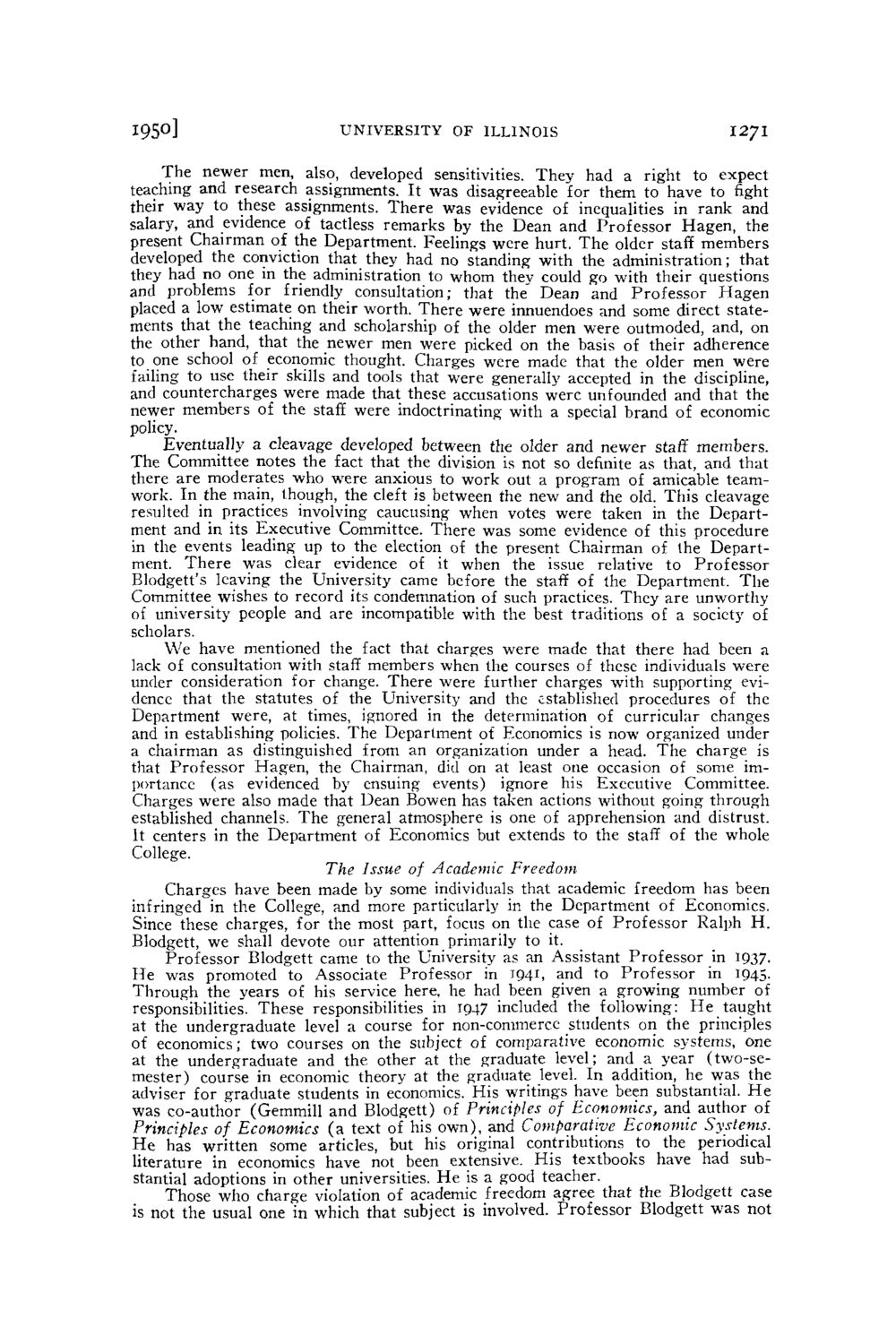| |
| |
Caption: Board of Trustees Minutes - 1950
This is a reduced-resolution page image for fast online browsing.

EXTRACTED TEXT FROM PAGE:
1950] UNIVERSITY OF I L L I N O I S 1271 The newer men, also, developed sensitivities. They had a right to expect teaching and research assignments. It was disagreeable for them to have to fight their way to these assignments. There was evidence of inequalities in rank and salary, and evidence of tactless remarks by the Dean and Professor Hagen, the present Chairman of the Department. Feelings were hurt. The older staff members developed the conviction that they had no standing with the administration; that they had no one in the administration to whom they could go with their questions and problems for friendly consultation; that the" Dean and Professor Hagen placed a low estimate on their worth. There were innuendoes and some direct statements that the teaching and scholarship of the older men were outmoded, and, on the other hand, that the newer men were picked on the basis of their adherence to one school of economic thought. Charges were made that the older men were failing to use their skills and tools that were generally accepted in the discipline, and countercharges were made that these accusations were unfounded and that the newer members of the staff were indoctrinating with a special brand of economic policy. Eventually a cleavage developed between the older and newer staff members. The Committee notes the fact that the division is not so definite as that, and that there are moderates who were anxious to work out a program of amicable teamwork. In the main, though, the cleft is between the new and the old. This cleavage resulted in practices involving caucusing when votes were taken in the Department and in its Executive Committee. There was some evidence of this procedure in the events leading up to the election of the present Chairman of the Department. There was clear evidence of it when the issue relative to Professor Blodgett's leaving the University came before the staff of the Department. The Committee wishes to record its condemnation of such practices. They are unworthy of university people and are incompatible with the best traditions of a society of scholars. We have mentioned the fact that charges were made that there had been a lack of consultation with staff members when the courses of these individuals were under consideration for change. There were further charges with supporting evidence that the statutes of the University and the established procedures of the Department were, at times, ignored in the determination of curricular changes and in establishing policies. The Department of Economics is now organized under a chairman as distinguished from an organization under a head. The charge is that Professor Hagen, the Chairman, did on at least one occasion of some importance (as evidenced by ensuing events) ignore his Executive Committee. Charges were also made that Dean Bowen has taken actions without going through established channels. The general atmosphere is one of apprehension and distrust. It centers in the Department of Economics but extends to the staff of the whole College. The Issue of Academic Freedom Charges have been made by some individuals that academic freedom has been infringed in the College, and more particularly in the Department of Economics. Since these charges, for the most part, focus on the case of Professor Ralph H . Blodgett, we shall devote our attention primarily to it. Professor Blodgett came to the University as an Assistant Professor in 1937. He was promoted to Associate Professor in 1041, a n d *° Professor in 1945. Through the years of his service here, he had been given a growing number of responsibilities. These responsibilities in 1947 included the following: H e taught at the undergraduate level a course for non-commerce students on the principles of economics; two courses on the subject of comparative economic systems, one at the undergraduate and the other at the graduate level; and a year (two-semester) course in economic theory at the graduate level. In addition, he was the adviser for graduate students in economics. His writings have been substantial. H e was co-author (Gemmill and Blodgett) of Principles of Economics, and author of Principles of Economics (a text of his own), and Comparative Economic Systems. H e has written some articles, but his original contributions to the periodical literature in economics have not been extensive. His textbooks have had substantial adoptions in other universities. H e is a good teacher. Those who charge violation of academic freedom agree that the Blodgett case is not the usual one in which that subject is involved. Professor Blodgett was not
| |